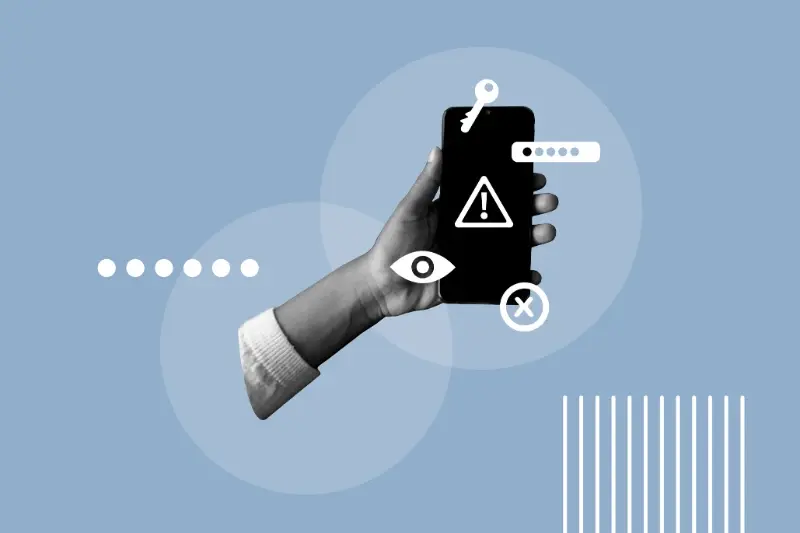The Real Cost of Poor App Security (and How to Avoid It)
Every 39 seconds, a mobile app somewhere in the world gets hacked. That's not just a scary statistic—it's a reality that affects millions of users and costs businesses billions of pounds each year. Most app owners think security breaches only happen to the big players, but smaller apps are actually hit more often because they're easier targets with weaker defences.
The thing is, when most people think about app security, they focus on the immediate technical problems. A bit of downtime here, some angry users there—job done, right? Wrong. The real damage from a security breach goes much deeper than most app owners realise; it touches every part of your business and can take years to recover from.
The average cost of a data breach for mobile applications has increased by 76% over the past five years, with small businesses being hit the hardest
What makes this even more frustrating is that most security breaches are completely preventable. It's not about having the most expensive security system or hiring an army of cybersecurity experts. It's about understanding what you're protecting against and taking the right steps before problems start. The protection investment you make today will always cost less than the breach consequences you'll face tomorrow.
What Happens When Mobile Apps Get Hacked
When a mobile app gets hacked, the effects spread far beyond just a bit of inconvenience. I've witnessed this firsthand with clients who thought security was something they could worry about "later"—spoiler alert: later comes much sooner than you'd expect!
The immediate impact hits users first. Their personal information gets stolen, passwords are compromised, and sometimes their payment details end up in the wrong hands. Banking apps might leak financial data; social apps could expose private messages; fitness apps might reveal personal health information. The hackers don't discriminate—they'll take whatever they can get their hands on.
The Domino Effect
Once the initial breach happens, things escalate quickly. Here's what typically unfolds:
- User data gets sold on dark web marketplaces
- Customers start deleting the app and leaving terrible reviews
- Media outlets pick up the story and run with it
- Regulatory bodies launch investigations
- Legal teams start preparing lawsuits
- Competitors gain market share whilst you're dealing with the mess
The worst part? Most app owners don't even know they've been hacked until weeks or months later. By then, the damage has already spread through their entire user base like wildfire.
The Financial Damage Nobody Talks About
When most people think about mobile app security breaches, they focus on the immediate technical problems—but the real financial damage runs much deeper than anyone expects. I've worked with companies who've been hit by security incidents, and the costs keep mounting up for months after the initial breach.
The obvious expenses are just the beginning. Yes, you'll need to hire security experts to fix the problem, and yes, you'll probably need to rebuild parts of your app. But that's actually the cheaper part of the whole ordeal.
The Hidden Costs That Really Hurt
The breach consequences that really damage your wallet are the ones you don't see coming. Lost customers mean lost revenue—and getting those customers back costs five times more than keeping them in the first place. Your app store rankings will drop when people leave bad reviews, which means fewer new downloads.
Start treating your protection investment like insurance—it's much cheaper to prevent problems than to fix them after they happen.
- Emergency security fixes and consultant fees
- Lost revenue from customers who stop using your app
- Marketing costs to rebuild your reputation
- Legal fees and potential fines
- Staff time spent dealing with the crisis instead of growing your business
The companies that survive these incidents are the ones who invested in proper security from the start. They understood that spending money on protection upfront saves them from spending ten times more later.
How User Trust Disappears Overnight
I've watched it happen more times than I care to count—an app that users loved suddenly becomes something they wouldn't touch with a ten-foot pole. One security breach is all it takes to completely destroy years of carefully built trust.
When personal data gets stolen, users don't just get annoyed and move on. They feel betrayed. They trusted you with their private information, their photos, their messages, their payment details—and you let them down. That's a personal violation that cuts deep.
The Ripple Effect
The damage spreads faster than you'd think. Users don't just quietly delete your app; they tell their friends, family, and colleagues about what happened. They leave angry reviews on app stores. They share their horror stories on social media. Each negative review pushes your app further down the rankings, making it harder for new users to find you.
The Long Road Back
Here's what really stings—getting that trust back takes years, not months. Even after you fix the security problems, people remember what happened. They question whether it's safe to use your app again. New users read those old reviews and think twice before downloading.
Some businesses never recover from a major security breach. The users they spent thousands attracting simply vanish, taking their friends and family with them.
Legal Problems That Follow Security Breaches
When your mobile app gets breached, the legal headaches start almost immediately. I've watched clients go from celebrating a successful app launch to dealing with lawyers faster than you can say "data protection violation." The thing is, cybercrime prevention isn't just about keeping hackers out—it's about staying on the right side of the law.
GDPR in Europe, CCPA in California, and dozens of other privacy laws around the world all have one thing in common: they make app owners responsible for protecting user data. Break those rules and you're looking at fines that can reach millions. The regulators don't care if you're a small startup or a Fortune 500 company; breach consequences hit everyone the same way.
We take data protection seriously, but we never expected the legal costs to dwarf the actual security fix
But fines are just the beginning. Users can sue for damages, especially if their personal information gets sold on the dark web. Class action lawsuits are becoming more common, and they drag on for years. Every email, every design decision, every security meeting gets scrutinised by lawyers. The protection investment you avoided at the start suddenly looks like pocket change compared to legal fees that can run into hundreds of thousands.
Simple Steps Every App Owner Should Take
Right, let's get practical. Security doesn't have to be overwhelming—there are straightforward things you can do today that will make your app much safer. I've worked with clients who thought security was some mystical dark art, but honestly, most of it is just good housekeeping.
Start With the Basics
First up: update everything. Your app, your servers, your development tools—keep them current. Those update notifications aren't just annoying pop-ups; they often contain security patches that fix known vulnerabilities. I can't tell you how many breaches I've seen that could have been prevented with a simple update.
Next, implement proper user authentication. Don't just rely on passwords—add two-factor authentication where possible. Make sure passwords are stored securely (never in plain text) and consider using proven authentication services rather than building your own from scratch.
Test Early and Often
Regular security testing should be part of your development process, not an afterthought. Run automated security scans, test your API endpoints, and check how your app handles different types of malicious input. Think of it like checking your car's brakes—you wouldn't wait until they fail to test them, would you?
Finally, have a response plan ready. When something goes wrong (and it might), you need to know exactly what steps to take. The faster you can respond, the less damage you'll face. If things go really badly, you might even need to change development teams mid-project to get proper security expertise on board.
Why Professional Security Audits Matter
Look, I'll be honest with you—most app owners think they can handle security on their own. They've got their basic SSL certificates, maybe some password encryption, and they think that's enough. But after years of working with companies who've learned the hard way, I can tell you that DIY security is like trying to perform surgery with a butter knife.
A professional security audit isn't just someone poking around your app for vulnerabilities. It's a systematic examination that covers everything from your server infrastructure to how your app handles user data. These experts use the same tools and techniques that actual hackers would use, but they're on your side. They'll find the weak spots before the bad guys do.
Schedule security audits every six months, not just when you launch. New vulnerabilities appear constantly, and your app changes over time.
What Security Audits Actually Cover
- Code review for common vulnerabilities
- Server configuration and access controls
- Data encryption and storage practices
- Third-party integrations and APIs
- User authentication systems
- Network security and data transmission
The best part? Most security issues are surprisingly simple to fix once you know they exist. It's finding them that's the tricky bit—and that's where the professionals earn their money. When choosing your development approach, security should be a key factor in your platform selection.
Conclusion
After years of building mobile apps, I can tell you that poor security isn't just a technical problem—it's a business killer. We've covered the financial damage, the lost trust, and the legal headaches that follow security breaches. But here's what I want you to take away: most of these problems are completely avoidable.
The cost of fixing security issues after a breach will always be higher than preventing them in the first place. Much higher. I've seen companies spend tens of thousands trying to recover from attacks that could have been prevented with a few hundred pounds worth of security measures. When you're putting together your mobile app business case, make sure security is factored into your budget from day one.
Start with the basics—encrypt your data, use proper authentication, and keep your code updated. These aren't complicated steps, but they'll protect you from the majority of common attacks. Then get your app professionally audited before you launch. Think of it as insurance for your business; you hope you'll never need it, but you'll be glad it's there. If you need help convincing stakeholders about the importance of proper security investment, remember that prevention is always cheaper than recovery.
Security doesn't have to be scary or expensive. It just needs to be done properly from the start. Your users are trusting you with their information, and that trust is worth protecting.
Share this
Subscribe To Our Blog
You May Also Like
These Related Stories

Common Security Mistakes That Could Sink Your Mobile App

Why 80% Of Business Apps Fail And How To Be In The 20%





